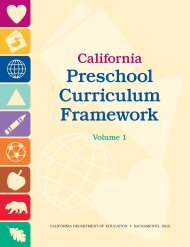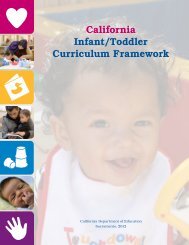California Preschool Learning Foundations - ECEZero2Three ...
California Preschool Learning Foundations - ECEZero2Three ...
California Preschool Learning Foundations - ECEZero2Three ...
Create successful ePaper yourself
Turn your PDF publications into a flip-book with our unique Google optimized e-Paper software.
than they do phonemes that are not in<br />
a cluster. For instance, children may<br />
be able to identify the three phonemes<br />
in pop but have difficulty in identifying<br />
the four phonemes in plop because the<br />
onset of the word contains a consonant<br />
cluster. The foundations address<br />
these variations in the level of difficulty<br />
of phonological awareness tasks by<br />
focusing the harder operations (e.g.,<br />
deleting parts of words and blending<br />
phonemes) on the initial parts of words<br />
(deleting onsets rather than deleting<br />
rimes) and on simple words (blending<br />
of words that have a limited number<br />
of phonemes and do not contain<br />
clusters).<br />
One additional source of variation<br />
relates to the amount and kind of supports<br />
provided to children so that they<br />
can perform these tasks. For example,<br />
when asking children to delete the<br />
onset of a word, the teacher can provide<br />
pictures of stimuli to reduce the<br />
level of difficulty of the task. This<br />
approach helps children to remember<br />
the different words and enhances their<br />
performance compared with having<br />
them perform this task without picture<br />
stimuli. When needed, the foundations<br />
emphasize phonological awareness<br />
performance within the context<br />
of support, and the expectation is that<br />
children will demonstrate mastery in<br />
the context of the support provided by<br />
pictures, props, objects, or other valid<br />
supportive context. This is the case<br />
for the foundations that involve the<br />
manipulation of smaller units of sound<br />
within more difficult forms of cognitive<br />
operations (e.g., deletion of a word’s<br />
initial phoneme).<br />
Phonological awareness is an important<br />
area of early and later reading<br />
instruction (Bowers 1995; Bowers<br />
and Wolf 1993; Lonigan, Burgess, and<br />
<strong>California</strong> Department of Education • <strong>Preschool</strong> <strong>Learning</strong> <strong>Foundations</strong>, Volume 1<br />
81<br />
Anthony 2000; Report of the National<br />
Reading Panel: Teaching Children to<br />
Read: An Evidence-Based Assessment<br />
of the Scientific Research Literature<br />
on Reading and Its Implications for<br />
Reading Instruction 2000; Prather,<br />
Hendrick, and Kern 1975; Templin<br />
1957; Wagner, Torgesen, and Rashotte<br />
1994; Wagner and others 1997). Phonological<br />
awareness plays a key role<br />
in several of the components that help<br />
children become skilled readers, such<br />
as understanding the alphabetic principle<br />
(Burgess and Lonigan 1998; Ehri<br />
1991, 1995), decoding printed words<br />
(Beck and Juel 1999; Bradley and Bryant<br />
1985; Byrne and Fielding-Barnsley<br />
1993, 1995; Demont and Gombert<br />
1996; Tunmer, Herriman, and Nesdale<br />
1988), spelling (Bryant and others<br />
1990; Gentry 1982; Read 1975), and<br />
reading comprehension—although this<br />
relation with reading comprehension is<br />
not direct (Tunmer and Nesdale 1985).<br />
Given the importance of phonological<br />
awareness to early and later<br />
literacy achievement, these foundations<br />
emphasize attention to its development<br />
for older preschool children.<br />
They do not include, however, specific<br />
indicators for younger children, as is<br />
explained next. First, evidence suggests<br />
that phonological awareness<br />
is not consistently mastered by children<br />
under four years of age (Lonigan,<br />
Burgess, and Anthony 2000),<br />
although performance at three years<br />
of age can be assessed and targeted<br />
through instruction. Second, vocabulary<br />
is highly related to children’s<br />
acquisition of phonological sensitivity<br />
(Burgess and Lonigan 1998; Chaney<br />
1992; Lonigan and others 1998; Lonigan,<br />
Burgess, and Anthony 2000).<br />
Most probably, the positive effect of<br />
vocabulary on phonological awareness<br />
LANGUAGE AND LITERACY
















